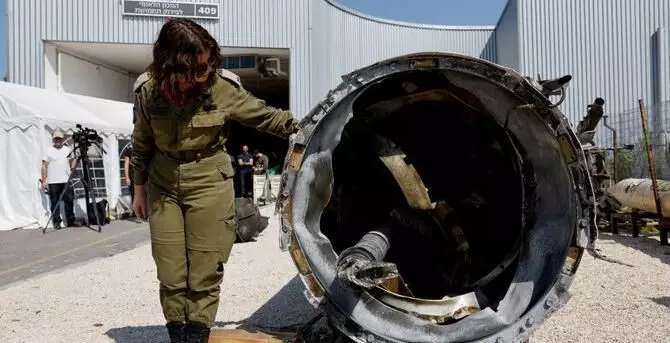
Tehran downplays alleged Israeli strikes, indicates no further action
text_fieldsIsrael's military displays on April 14, 2024, an Iranian ballistic missile retrieved from the Dead Sea after Iran launched drones and missiles towards Israel | Photo: Reuters/File Photo
Jerusalem: Explosions resounded above an Iranian city on Friday from an alleged Israeli attack, but Tehran downplayed the explosions and said it had no intentions to retaliate, seemingly aiming to prevent a regional conflict.
Diplomats have been trying nonstop since last Saturday's Iranian drone and missile strike on Israel to prevent a full-scale conflict, and the attack's limited scale and Iran's subdued reaction both seemed to indicate a successful effort.
Iranian officials and media reported a few explosions, claiming that they were caused by three drones being struck by Iran's air defences over the city of Isfahan. Interestingly, they avoided calling the incident an attack by Israel by referring to it as an attack by "infiltrators," therefore there was no need for retaliation
According to an Iranian official, there were no intentions to respond to Israel for the incident, Arab News reported.
“The foreign source of the incident has not been confirmed. We have not received any external attack, and the discussion leans more toward infiltration than attack,” the official said.
Regarding the incident, Israel remained silent. For several days, it had declared that it would take revenge on Iran for the strikes that occurred on Saturday. These strikes marked Iran's first direct assault on Israel in decades of shadow war that escalated throughout the Middle East and resulted in six months of fighting in Gaza.
US media cited authorities as claiming that although the US was informed in advance of Israel's alleged strike on Iran, it did not approve of the operation or participate in its carrying out.
According to NBC and CNN, who cited people with knowledge of the situation and a US official, respectively, Israel had given Washington advance notice of the strike.
Officials confirmed that a strike had occurred within Iran, according to various networks. CNN quoted one official who said the target was not a nuclear site.
Since an apparent Israeli bombing on April 1 that damaged a building in Iran's embassy compound in Damascus and killed seven Iranian personnel, including a top general, the two long-standing enemies had been heading towards direct confrontation.
Although Iran's direct attack on Israel was unprecedented, Israel and its allies shot down hundreds of missiles and drones, preventing any casualties and relatively slight damage.
Since then, allies, especially the US, have exerted significant pressure to guarantee that any additional retaliation is calibrated so as to avoid escalating hostilities. This week, the foreign ministers of Germany and the United Kingdom visited Jerusalem, and in an effort to appease Israel, Western nations increased sanctions against Iran.
Itamar Ben Gvir, the far-right national security minister, tweeted just one word following Friday's strikes: "Feeble!"—a signal that the hard-right government in Israel is under pressure to provide a more forceful reaction.
On Friday, nations from all around the world urged both parties to prevent escalation.
“It is absolutely necessary that the region remains stable and that all sides restrain from further action,” EU Commission head Ursula von der Leyen said. Beijing and the Arab powers in the region made similar appeals.
As investors became more concerned about the risks, global shares eased, oil prices rose, and US bond yields decreased.
No mention of Israel
Israel was not mentioned in Iranian news coverage of Friday's incident, while pundits and analysts on state television seemed to downplay the episode's magnitude.
Air defences in Isfahan shot down small drones piloted by "infiltrators from inside Iran," an analyst told state TV.
Shortly after midnight, “three drones were observed in the sky over Isfahan. The air defence system became active and destroyed these drones in the sky,” Iranian state TV said.
According to state TV, senior army commander Siavosh Mihandoust stated that air defence systems had targeted a "suspicious object."
Prior to Friday's bombing, Iranian President Ebrahim Raisi had issued a warning to Israel, stating that Tehran would respond to any attack on its land with a "severe response."
The Middle East is in a "moment of maximum peril," the UN secretary-general warned, while Iran urged the UN Security Council on Thursday that Israel "must be compelled to stop any further military adventurism against our interests."
Airports and airspace that had been closed due to the strikes had reopened in Iran by morning.
Security concerns persisted, both in Israel and internationally. Travel outside of Jerusalem, greater Tel Aviv, and Beersheba were restricted for US government employees by the US Embassy in Jerusalem "out of an abundance of caution."
In a statement, the embassy warned US citizens of a “continued need for caution and increased personal security awareness as security incidents often take place without warning.”
After Hamas attacked Israel on October 7, killing 1,200 people, according to Israeli estimates, Israel launched its assault on Gaza. The Gazan Health Ministry reports that around 34,000 Palestinians have died in Gaza as a result of Israel's military onslaught.
There are concerns that the Gaza conflict may turn into a larger regional confrontation as a result of forces backed by Iran pledging their support for the Palestinian cause and launching strikes from Lebanon, Yemen, and Iraq.























